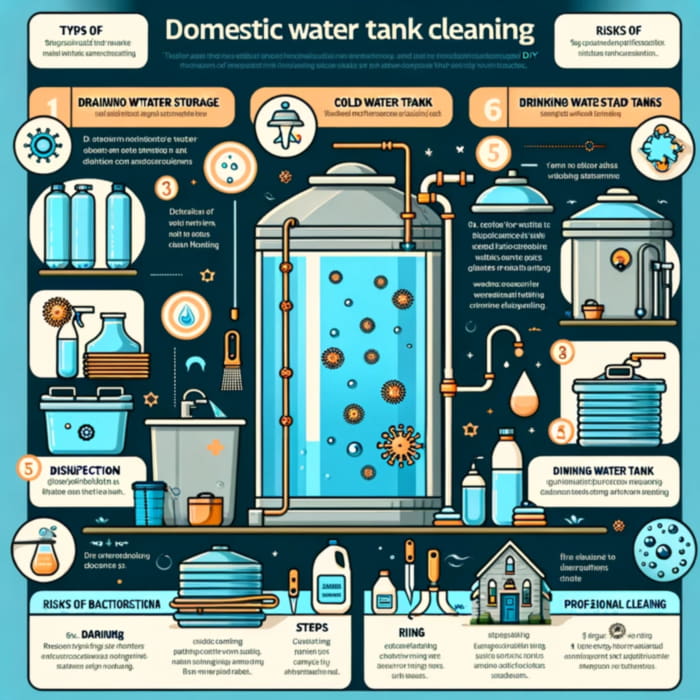Water is essential for life, and ensuring that the water you consume is clean and safe is paramount. This comprehensive guide delves into the critical subject of domestic water tank cleaning. Whether it’s a drinking water tank or a cold water storage tank in your home, understanding the importance of regular cleaning and disinfection is vital for maintaining water hygiene and safeguarding your family’s health. This article covers everything from the types of water tanks to the step-by-step cleaning process, providing valuable insights for both domestic and commercial water tank owners.
Understanding Various Water Tank Types
Cold Water Storage Tanks: Typically found in the attic, these tanks are prone to sediment and algae build-up.
Drinking Water Tanks: These require extra caution to prevent contamination.
The Importance of Tank Type in Cleaning and Maintenance
Different materials and designs dictate specific cleaning methods. For instance, plastic tanks might need milder cleaning agents compared to metal tanks.
The Health Risks of Neglected Water Tanks
Unmaintained tanks can harbour bacteria like Legionella, leading to serious health issues. Regular cleaning prevents bacterial growth and ensures water hygiene.
How Regular Cleaning Benefits Your Water Supply
Cleaning eliminates contaminants, ensuring the quality of your domestic water. This is especially crucial for households relying on mains water supply.
Draining the Tank: The First Crucial Step
Emptying the tank allows for a thorough inspection and cleaning. Make sure the tank is completely drained to remove all sediment.
Scrubbing and Disinfecting: Ensuring a Thorough Clean
Use appropriate cleaning agents to scrub the inside of the tank. Disinfection is essential to eliminate any lingering bacteria or viruses.
Rinsing and Refilling: Completing the Cleaning Process
After cleaning, the tank should be thoroughly rinsed and refilled with clean water. Ensure there’s no residue of cleaning agents.
Identifying and Understanding Waterborne Pathogens
Legionella bacteria, which thrive in stagnant water, can cause severe respiratory issues. Regular cleaning disrupts their habitat, reducing health risks.
Preventive Measures to Keep Your Water Safe
Regular monitoring and maintenance of your water tank are key. Use water treatment methods to maintain water quality.
The Recommended Frequency for Water Tank Cleaning
Experts suggest cleaning domestic water tanks at least annually. However, the frequency may vary based on water usage and tank condition.
Signs That Your Water Tank Needs Immediate Cleaning
Unusual taste or smell, discolouration, and sediment in the water are tell-tale signs that your tank requires immediate attention.
Evaluating the Pros and Cons
Evaluating the pros and cons of domestic water tank cleaning can offer insight into its importance.
The major benefit is the removal of harmful bacteria, ensuring clean water for household use. However, it requires professional intervention for proper cleaning, involving extra costs and potentially causing inconvenience with service scheduling.
When to Call in Professional Tank Cleaning Services
Consider professional cleaning if the tank is large, complex, or if you’re unsure about the cleaning process.
How often should water tanks be cleaned?
Domestic water tanks should be cleaned regularly, ideally every 6 to 12 months. This timeframe ensures that water stays fresh and any debris or potential bacterial growth is removed, consequently maintaining the water quality and tank longevity. It’s necessary for both health and overall system maintenance.
Summary
- Regular cleaning of your domestic water tank is vital for maintaining water hygiene and health safety.
- Different types of water tanks require specific cleaning approaches.
- Draining, scrubbing, disinfecting, rinsing, and refilling are key steps in the cleaning process.
- Be aware of the risks posed by bacteria like Legionella and the importance of preventive measures.
- Clean your water tank at least annually, or more frequently depending on usage and water quality.
- Weigh the benefits of DIY versus professional water tank cleaning based on your specific situation.
Understanding and implementing these guidelines can significantly impact the quality of your domestic water, ensuring it remains clean, safe, and healthy for consumption.


